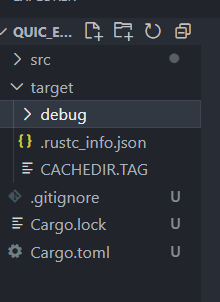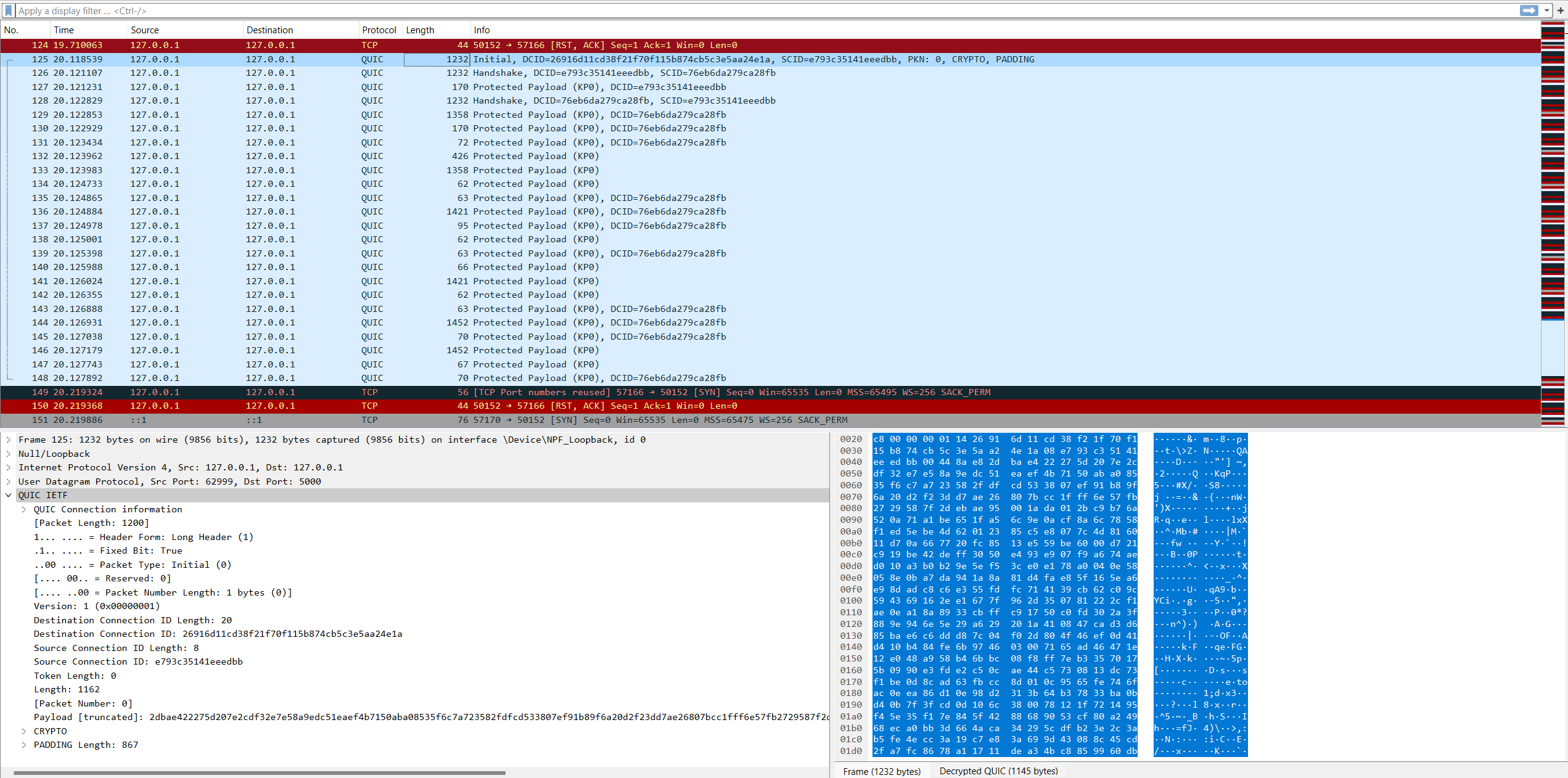Rust实现quic网络协议
wirte in ChengDu 03 July 2024
开始
最近在学习rust语言和quic网络协议,刚好将两者结合写一个小小的demo,主要使用quinn包实现;
新建rust项目
- 在工作目录下新建cargo项目
cargo new quic_example采用cargo命令行创建rust代码项目,cargo工具将自动创建相关依赖文件和目录如下所示:
添加quinn依赖
- 在目录结构下找到
Cargo.toml文件,此文件为整个项目的依赖项配置信息文件,添加项目所需的依赖,quinn和tokio,修改文件内容如下: -
[dependencies] quinn = "0.10.2" tokio = { version = "1", features = ["full"]} rustls = { version = "0.21.0" ,features = ["dangerous_configuration"]} rcgen = "0.11.1"
server端代码
// src/server.rs
use std::{error::Error, net::SocketAddr, sync::Arc};
use quinn::{Endpoint, ServerConfig};
// Runs a QUIC server bound to given address.
pub async fn run_server(addr: SocketAddr) {
let (endpoint, _server_cert) = make_server_endpoint(addr).unwrap();
// accept a single connection
let incoming_conn = endpoint.accept().await.unwrap();
let conn = incoming_conn.await.unwrap();
println!(
"[server] connection accepted: addr={}",
conn.remote_address()
);
loop {
match conn.accept_bi().await {
Ok((_send_stream, mut recv_stream)) => {
println!("[server] stream accepted: {}", recv_stream.id());
tokio::spawn(async move {
loop {
let mut buffer = vec![0u8; 1024 * 8];
match recv_stream.read(&mut buffer).await {
Ok(x) => match x {
Some(_) => {}
None => {
println!("[server] stream closed");
break;
}
},
Err(e) => {
println!("[server] read error: {}", e);
break;
}
}
}
});
}
Err(e) => {
println!("[server] connection error: {}", e);
break;
}
}
}
}
#[allow(unused)]
pub fn make_server_endpoint(bind_addr: SocketAddr) -> Result<(Endpoint, Vec<u8>), Box<dyn Error>> {
let (server_config, server_cert) = configure_server()?;
let endpoint = Endpoint::server(server_config, bind_addr)?;
Ok((endpoint, server_cert))
}
/// Returns default server configuration along with its certificate.
fn configure_server() -> Result<(ServerConfig, Vec<u8>), Box<dyn Error>> {
let cert = rcgen::generate_simple_self_signed(vec!["localhost".into()]).unwrap();
let cert_der = cert.serialize_der().unwrap();
let priv_key = cert.serialize_private_key_der();
let priv_key = rustls::PrivateKey(priv_key);
let cert_chain = vec![rustls::Certificate(cert_der.clone())];
let mut server_config = ServerConfig::with_single_cert(cert_chain, priv_key)?;
let transport_config = Arc::get_mut(&mut server_config.transport).unwrap();
transport_config.max_concurrent_uni_streams(0_u8.into());
Ok((server_config, cert_der))
}
client端代码
// src/client.rs
use std::{error::Error, net::SocketAddr, sync::Arc};
use quinn::{Endpoint, ClientConfig};
pub async fn run_client(server_addr: SocketAddr) -> Result<(), Box<dyn Error>> {
let mut endpoint = Endpoint::client("127.0.0.1:0".parse().unwrap())?;
endpoint.set_default_client_config(configure_client());
// connect to server
let connection = endpoint
.connect(server_addr, "localhost")
.unwrap()
.await
.unwrap();
println!("[client] connected: addr={}", connection.remote_address());
let (mut send_stream1, _recv_stream) = connection.open_bi().await?; // added mut keyword
send_stream1.set_priority(0)?;
let (mut send_stream2, _recv_stream) = connection.open_bi().await?;
send_stream2.set_priority(2)?;
send_stream1.write_all("buf1".as_bytes()).await.unwrap();
send_stream2.write_all("buf2".as_bytes()).await.unwrap();
send_stream1.finish().await.unwrap();
if let Err(e) = send_stream2.finish().await {
println!("[client] stream finish error: {}", e);
}
connection.close(0u32.into(), b"done");
// Dropping handles allows the corresponding objects to automatically shut down
//drop(connection);
// Make sure the server has a chance to clean up
endpoint.wait_idle().await;
Ok(())
}
fn configure_client() -> ClientConfig {
let crypto = rustls::ClientConfig::builder()
.with_safe_defaults()
.with_custom_certificate_verifier(SkipServerVerification::new())
.with_no_client_auth();
ClientConfig::new(Arc::new(crypto))
}
struct SkipServerVerification;
impl SkipServerVerification {
fn new() -> Arc<Self> {
Arc::new(Self)
}
}
impl rustls::client::ServerCertVerifier for SkipServerVerification {
fn verify_server_cert(
&self,
_end_entity: &rustls::Certificate,
_intermediates: &[rustls::Certificate],
_server_name: &rustls::ServerName,
_scts: &mut dyn Iterator<Item = &[u8]>,
_ocsp_response: &[u8],
_now: std::time::SystemTime,
) -> Result<rustls::client::ServerCertVerified, rustls::Error> {
Ok(rustls::client::ServerCertVerified::assertion())
}
}
main函数调用服务
// src/main.rs
use std::error::Error;
mod server;
mod client;
// fn main() {
// std::thread::spawn(|| {
// server::main();
// });
// std::thread::sleep(std::time::Duration::from_secs(1));
// client::main();
// //println!("Hello, world!");
// }
// use tokio::io::AsyncWriteExt;
#[tokio::main]
async fn main() -> Result<(), Box<dyn Error>> {
// server and client are running on the same thread asynchronously
let addr = "127.0.0.1:5000".parse().unwrap();
tokio::spawn(server::run_server(addr));
client::run_client(addr).await?;
Ok(())
}
#[allow(unused)]
pub const ALPN_QUIC_HTTP: &[&[u8]] = &[b"hq-29"];
运行代码
- 首次运行时,将根据依赖包进行下载,下载成功后执行main.rs
PS D:\personal\quic_example> cargo run
warning: both `C:\Users\eileench\.cargo\config` and `C:\Users\eileench\.cargo\config.toml` exist. Using `C:\Users\eileench\.cargo\config`
Compiling rustls v0.21.12
Compiling powerfmt v0.2.0
Compiling num-conv v0.1.0
Compiling time-core v0.1.2
Compiling base64 v0.22.1
Compiling deranged v0.3.11
Compiling pem v3.0.4
Compiling time v0.3.36
Compiling yasna v0.5.2
Compiling rcgen v0.11.3
Compiling quinn-proto v0.10.6
Compiling quinn v0.10.2
Compiling quic_example v0.1.0 (D:\personal\quic_example)
warning: unused import: `tokio::io::AsyncWriteExt`
--> src/main.rs:23:5
|
23 | use tokio::io::AsyncWriteExt;
| ^^^^^^^^^^^^^^^^^^^^^^^^
|
= note: `#[warn(unused_imports)]` on by default
warning: `quic_example` (bin "quic_example") generated 1 warning
Finished `dev` profile [unoptimized + debuginfo] target(s) in 34.77s
Running `target\debug\quic_example.exe`
[client] connected: addr=127.0.0.1:5000
[server] connection accepted: addr=127.0.0.1:54697
[server] stream accepted: client bidirectional stream 0
[server] stream accepted: client bidirectional stream 1
[server] stream closed
[server] stream closed
[server] connection error: closed by peer: done (code 0)
抓包查看quic网络报文
打开本地wireshark进行抓包分析: 